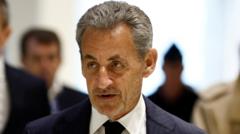Sarkozy's legal troubles deepen as he stands trial for purportedly accepting significant funds from Gaddafi to fuel his 2007 campaign.
Nicolas Sarkozy Trials Unfold: Accusations of Gaddafi Funding Surface Again

Nicolas Sarkozy Trials Unfold: Accusations of Gaddafi Funding Surface Again
Former French President faces scrutiny over alleged illicit campaign financing linked to late Libyan leader.
Former French president Nicolas Sarkozy finds himself in the dock again in Paris, facing allegations of receiving vast sums of money from the late Libyan dictator Muammar Gaddafi to assist in financing his successful 2007 election campaign. Prosecutors claim that in return for Gaddafi's support, Sarkozy secured commitments to bolster the Libyan leader's standing with Western nations, which had labeled him a pariah.
Now 69, Sarkozy led France from 2007 until 2012 and has consistently denied any wrongdoing, dismissing the charges as a politically motivated attack designed to undermine him. The long-running investigation began in 2013, ignited by accusations from Saif al-Islam, Gaddafi's son, who claimed that Sarkozy unlawfully received millions in campaign financing from his father.
In a subsequent development, Lebanese businessman Ziad Takieddine alleged he had evidential documents demonstrating that Tripoli financed Sarkozy's campaign with up to €50 million (approximately £43 million), implying that the transactions continued even after Sarkozy ascended to the presidency. Alongside Sarkozy, 12 other individuals implicated in the alleged conspiracy with Gaddafi are also standing trial, all of whom maintain their innocence.
Additionally, Sarkozy's wife, Carla Bruni-Sarkozy, has faced charges herself regarding her alleged role in obscuring evidence related to the Gaddafi affair and colluding with reportedly corrupt individuals to carry out fraud. Nonetheless, she also vehemently denies all accusations against her.
Sarkozy's legal troubles have multiplied since he lost his bid for re-election in 2012; numerous investigations have been directed at him, including a recent appeal against a February 2024 ruling declaring him guilty of overspending during his 2012 campaign and subsequently attempting to obstruct justice through a PR cover-up. Ultimately, he received a one-year prison sentence, with six months suspended.
In 2021, Sarkozy was convicted of attempting to bribe a judge in a separate case, earning him the notoriety of being the first former French president sentenced to prison. However, a Paris appeals court allowed him to serve his sentence at home with an electronic monitoring device instead of in a traditional prison environment. As he arrived at the Paris courthouse on Monday, Sarkozy was not wearing the monitoring tag, which is still being finalized. However, it is expected that during the three-month trial regarding the purported Libya connection, he may be required to don the device. The trial is scheduled to proceed until April 10, and should Sarkozy be found guilty, he could face a maximum of ten years behind bars.
Now 69, Sarkozy led France from 2007 until 2012 and has consistently denied any wrongdoing, dismissing the charges as a politically motivated attack designed to undermine him. The long-running investigation began in 2013, ignited by accusations from Saif al-Islam, Gaddafi's son, who claimed that Sarkozy unlawfully received millions in campaign financing from his father.
In a subsequent development, Lebanese businessman Ziad Takieddine alleged he had evidential documents demonstrating that Tripoli financed Sarkozy's campaign with up to €50 million (approximately £43 million), implying that the transactions continued even after Sarkozy ascended to the presidency. Alongside Sarkozy, 12 other individuals implicated in the alleged conspiracy with Gaddafi are also standing trial, all of whom maintain their innocence.
Additionally, Sarkozy's wife, Carla Bruni-Sarkozy, has faced charges herself regarding her alleged role in obscuring evidence related to the Gaddafi affair and colluding with reportedly corrupt individuals to carry out fraud. Nonetheless, she also vehemently denies all accusations against her.
Sarkozy's legal troubles have multiplied since he lost his bid for re-election in 2012; numerous investigations have been directed at him, including a recent appeal against a February 2024 ruling declaring him guilty of overspending during his 2012 campaign and subsequently attempting to obstruct justice through a PR cover-up. Ultimately, he received a one-year prison sentence, with six months suspended.
In 2021, Sarkozy was convicted of attempting to bribe a judge in a separate case, earning him the notoriety of being the first former French president sentenced to prison. However, a Paris appeals court allowed him to serve his sentence at home with an electronic monitoring device instead of in a traditional prison environment. As he arrived at the Paris courthouse on Monday, Sarkozy was not wearing the monitoring tag, which is still being finalized. However, it is expected that during the three-month trial regarding the purported Libya connection, he may be required to don the device. The trial is scheduled to proceed until April 10, and should Sarkozy be found guilty, he could face a maximum of ten years behind bars.




















